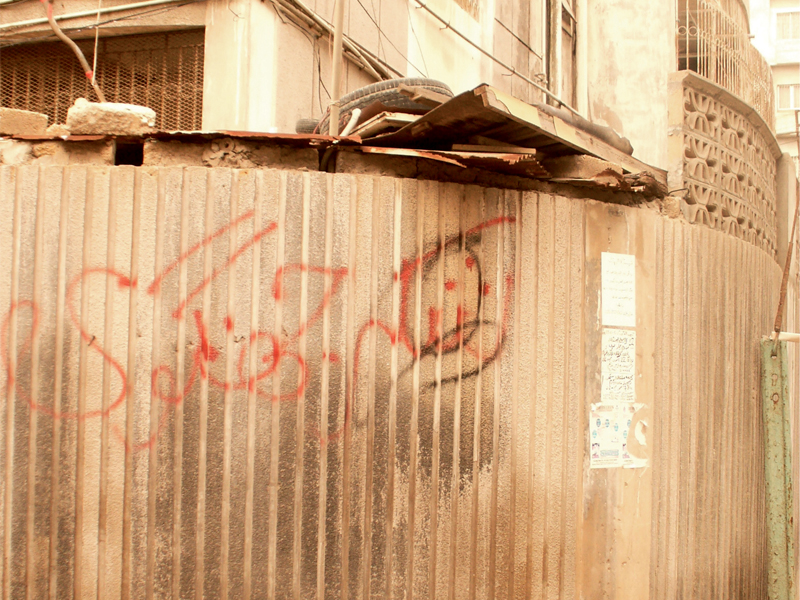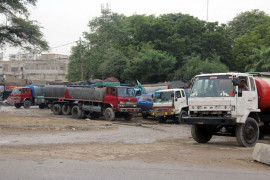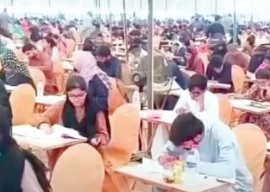
An hour later, on their way back, as commuters pick groceries from the shops located around the Britto Road, extortionists casually go about their business, quietly instructing the shopkeepers to handover the “Daily”. Two more hours into the dark, shots of gunfire from Patel Para replace the now lowered down traffic noise.
This is the account of an evening of a large majority of the Ismaili community living in Garden East. Their troubles have just been compounded by an immense sense of insecurity following the attack on the Karimabad Jamaat Khana on August 13. The residents had, however, sensed such an attack long before from hints appearing all across the locality. The apartment buildings and the Aga Khan Park, just a few metres away from the Jamaat Khana, are covered with wall-chalkings which scream, “Jiye Taliban!”, “Lashkar-e-Jhangvi Zaindabad”, and “Long Live Sipah-e-Sahaba”. A professional painter Ali-Muawiya has also scrawled a message for the women of the community, “Pardey daar aurat haqeeqi aurat hoti hai [A veiled woman is a real woman],” on the park’s wall. Community volunteers admit that they feel extremely vulnerable on duty in the evenings. “The female visitors are frequently harassed by young men coming from Patel Para. We have to tread very carefully to protect the community people as well as avoid any unnecessary confrontation,” shared one volunteer.
In the grip of violence
The people of Garden East are among those who have witnessed Karachi’s degeneration from a close range. The vertical spread of housing units has replaced 70- to 100-year-old colonial structures. The latest regressive building regulations rid builders of the obligation to keep space for car parking and playgrounds. The restricted space curbs more than just movement - young boys are forced to take to the streets for casual sports, battling the constant flow of vehicles. Due to the fear of harassment, girls are not allowed by their parents to step out of house “unnecessarily”. Street crimes are common as criminals find their easy targets in people struggling to move between parked cars and flowing gutters.
Episodes of public violence have become a norm of the first six months of the year alone seven bodies were found from the Garden area, according to the South Asia Terrorism Portal. Three traffic wardens were murdered close to the Jamaat Khana in the month of April.
A struggling community
The Ismaili community has mostly remained apolitical even though their late spiritual leader Sir Sultan Muhammad Shah Aga Khan III is known to be among the pioneers of the idea of Pakistan. The community, however, displayed a fair degree of interest in the democratic engagement.
The 2013 elections saw one of the highest voter turnouts in NA-252 constituency covering the Garden East area [321,191 registered voters with over 53% turnout compared to 277,553 with 42% turnout in the 2008 elections].
The community members also volunteered at the polling stations but the enthusiastic participation and the spirit of volunteerism, unaccompanied by citizen action or a movement to influence change, did little for the plight of the Garden East.
The writer is a resident of Garden East
Changing demographics, landscapes
The area’s demography and landscape are changing rapidly. The Ismaili population, which originally moved here in the 1940s and later to live close to the world’s biggest jamaat khana which can accommodate over 20,000 people, is emigrating to either Clifton/Defence or abroad, out of security fears. Though they are being replaced by the Ismailis from Karimabad and Kharadar, the area is now quietly being taken over by a growing migration of non-Ismaili communities, especially Memons, Pashtun and Baloch.
The biggest mosque of the area, Pakola Masjid, is now surrounded by five other mosques within walking distance. Garden East’s only park, Aga Khan Park, has been completely shut for any activity apart from occasional sports and Eid prayers. There is a section for women that opens only for certain hours in the day. Unlike other parks in the city, the AK Park has been walled rather than grilled. While drug addicts manage to sneak into the park, its locked gates make it inaccessible for the public of the area.
The changes in demographics have had a very deep impact on the community’s living, sense of security and interaction with the society. In the 1980s and the 1990s, the community used to host weekly youth events that enjoyed packed attendance at the community ground next to the Jamaat Khana. Today, security concerns allow no such activity.
Published in The Express Tribune, October 16th, 2013.
COMMENTS (15)
Comments are moderated and generally will be posted if they are on-topic and not abusive.
For more information, please see our Comments FAQ




1714558558-0/It-Ends-With-Us-(1)1714558558-0-165x106.webp)


1725254039-0/Untitled-design-(24)1725254039-0-270x192.webp)















I grew in up Karachi, Garden East. I am saddened to see this beautiful area gone down the drain like the rest of Karachi, for that matter the whole of Pakistan. I pray to Allah for safekeeping of my beautiful country Ameen!
Can you imagine the following people have lived in Garden East. I.I.Chundrigar(Prime minister), Khalid Ishque(Advocate General), Raees Amrohi @ Jon Aliya, Sister of Zulfiqar Ali Bhutto, Habib Wali Mohammed(Industrialist @ Marvellous singer. May ALLAH keep Garden East &ofcourse Karachi under HIS protection. AMEEN. I was born in Karachi and Most of thr time I have breathed in Garden East.
A very good article which reflects the actual situation now days. Being a volunteer I have witnessed so many issues and experienced two times mobile phone snatching. The situation is known to the law and enforcement agency but the negligence not allow them to do any strict action against culprits.
Sadly the damage has been done. Garden used to be one of the most affluent areas of Karachi. Political influence has done way too much of damage combined with all the other factors you mentioned. Nonetheless good read!!
Really? We are lamenting a neighbourhood for one affluent community, what about the rest of Karachi and Karachiites? It's time we shed these garbs of ethnic communities and think and act like pure Karachiites to save this admirable city from the claws of loots, extortionists, corrupt politicians and criminals
This is a bitter reality. thanks Zeenia for highlighting this and I am sure after reading this article some one will voluntarily take the lead to mobilize the people. its not only affecting the ismaili community, however, the other peaceful citizens who are living here for ages and represents as a real karachites..
Great write-up Zenia.
Interesting facts. couldnt relate more to it.
Have always been a fan of your writing, you just refreshed it all over.
Rgds. Sadiq
What a travesty.
It's sad to see that such an amazing area turned into a area where now people are thinking of moving. I don't want to name political party and religious forces but they are equally responsible to scare the educated middle class away from garden east
I grew up in the Garden East area in the 90s and always heard people say that Garden East is the safest and most peaceful area in Karachi. It doesn't seem like it anymore #Disheartened
Its heart-breaking to read this. Born & brought up in Garden East I have so many good memories attached to the JK & the Aga Khan Park. Used to be very peaceful & full of fun.. God Bless all residing in the area.
Well ... small wonder - all things come to an end - good and bad alike .waqt ki quaid mein zindagi hai magar - chand ghadiyan yahee hai jo azaad hai .... Make the most of THIS Time.
Garden East was a very neat clean and peaceful area.One could walk even at late night alone. In 1960s the streets were washed every sunday. The Christians,the Aga Khani muslims,The Memons etc all lived in peace and harmony. Pakola Masjid (Ghafooria Masjid) was the largest mosque in the area surrounded by the Pakola family residence.
At one time, the US Consulate residence were on Maneckji Street and Britto road.in Garden East The decline of the area started with Multi story residence coming up with first building being Jumani center. Now that area has become a jungle and civic amenities have disappeared. Law and order problem has become serious
ET : excellent article
So sad!